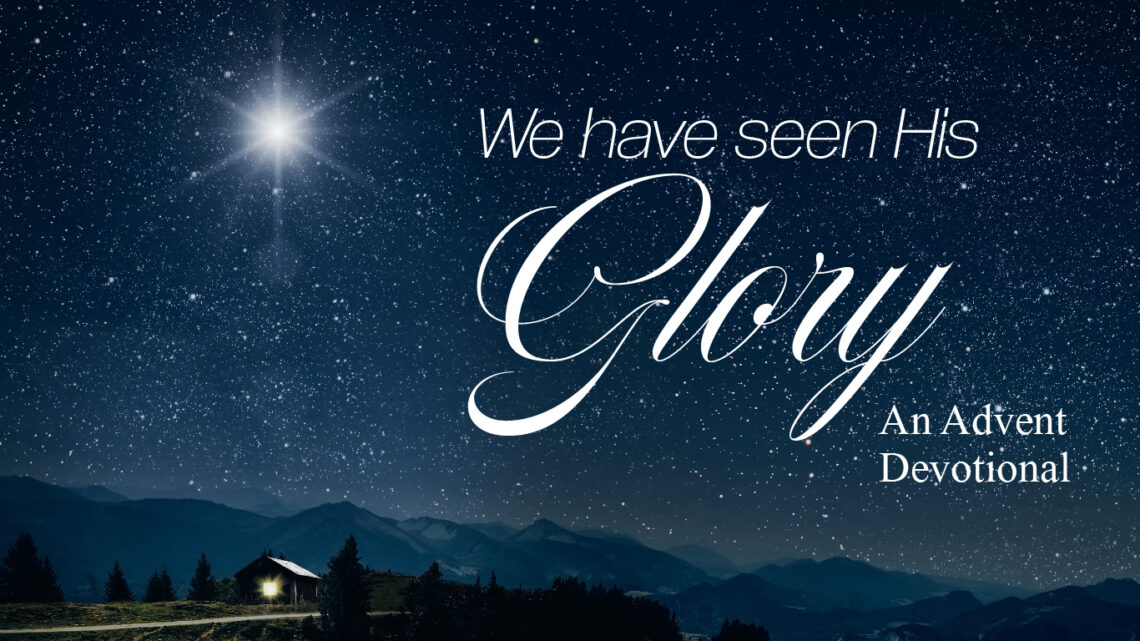
Glory – 2022 Advent Devotional

Glory in the Every Day
By Sarah Lee Thomas As I begin to write, my mind is scattered about on my list, the to-dos, the to-gets, mentally mapping out the remaining hours and trying to figure out where all the pieces will fit–don’t forget the thing another neuron fires off! It’s hard this season to just pause and be present in the moments. Who am I kidding, it’s kinda always hard to do that anymore. Our lives are pretty constantly full of ordinary, everyday things. Fun things and chores. We always have water to fetch or sheep to tend. Moses was doing everyday things in Exodus 3 when he turned to see the Glory of God… Exodus 3: 1 Now Moses was tending the flock of Jethro his father-in-law, the priest of Midian. And he led the flock to the back of the desert, and came to Horeb, the mountain of God. 2 And the Angel of the Lord appeared to him in a flame of fire from the midst of a bush. So he looked, and behold, the bush was burning with fire, but the bush was not consumed. 3 Then Moses said, “I will now turn aside and see this great sight, why the bush does not burn.” The woman at the well was doing everyday things in John 4 when Jesus met her there and spoke to her… 7 A woman of Samaria came to draw water. Jesus said to her, “Give Me a drink.” 26 Jesus said to her, “I who speak to you am He.” The shepherds were doing everyday things in Luke 2 when they were given the glorious news… 8 And there were shepherds residing in the fields nearby, keeping watch over their flocks by night. 9 Just then an angel of the Lord stood before them, and the glory of the Lord shone around them, and they were terrified. 10 But the angel said to them, “Do not be afraid! For behold, I bring you good news of great joy that will be for all the people: 11 Today in the city of David a Savior has been born to you. He is Christ the Lord! 12 And this will be a sign to you: You will find a baby wrapped in swaddling cloths and lying in a manger.” 13 And suddenly there appeared with the angel a great multitude of the heavenly host, praising God and saying: 14 “Glory to God in the highest, and on earth peace to men on whom His favor rests!” 15 When the angels had left them and gone into heaven, the shepherds said to one another, “Let us go to Bethlehem and see this thing that has happened, which the Lord has made known to us.” I’ve read Matthew 28 before and felt at a loss, asked myself how’s this supposed to work or thought maybe someday we can be part of a mission trip. Recently, and this will be familiar to those that did Jonah with me this fall, I got a different perspective on the Great Commission. Priscilla Shirer in relating the Go of Matthew 28 and the Go in Jonah, shared with us that “in the Greek language, go is an aorist participle, which means it takes on the mood of the command–making disciples. It could more accurately be translated as going. In other words, the command to make disciples should be accomplished while believers are going about their business. As you are going make disciples in all the nations…we must remember that sharing Jesus is supposed to be a way we live, not just something we do.” One of my favorite passages specifically in The Message, talks about our everyday ordinary lives. Romans 12: 1-2 So here’s what I want you to do, God helping you: Take your everyday, ordinary life—your sleeping, eating, going-to-work, and walking-around life—and place it before God as an offering. Embracing what God does for you is the best thing you can do for him. Don’t become so well-adjusted to your culture that you fit into it without even thinking. Instead, fix your attention on God. You’ll be changed from the inside out. Readily recognize what he wants from you, and quickly respond to it. Unlike the culture around you, always dragging you down to its level of immaturity, God brings the best out of you, develops well-formed maturity in you. This Christmas, find comfort and cheer in the fact that even in the water fetching and sheep herding, we only need to look and see that the Glory is there with us, always. Now, go make Christmas merry and bright for others by sharing Jesus as you shine the light of your everyday, ordinary, joyful life across their path.

Rock of Ages
He is the radiance of the glory of God and the exact imprint of His nature Hebrews 1:3 Since that very first sin, humans have not been able to stand before God and live. He is too holy, and we are too tainted by sin to even stand in His presence. Jesus changed all of that. Everything we could ever wonder about God, ever long to know or see about Him, is now made manifest when Jesus Christ was born. Moses said, “Please show me your glory.” And he said, “I will make all my goodness pass before you and will proclaim before you my name ‘The LORD.’ And I will be gracious to whom I will be gracious, and will show mercy on whom I will show mercy. But,” he said, “you cannot see my face, for man shall not see me and live.” And the LORD said, “Behold, there is a place by me where you shall stand on the rock, and while my glory passes by I will put you in a cleft of the rock, and I will cover you with my hand until I have passed by. Then I will take away my hand, and you shall see my back, but my face shall not be seen.” Exodus 33:18–23 Moses’ one desire this day was to see God’s glory, but God knew that Moses wouldn’t be able to see Him and live. God grants Moses’ request, He makes a way for Moses to see His glory without dying instantly. He sets Moses in the cleft of a rock, covers him with His own hand, and will pass by so Moses can see Him. A “cleft” is a split in a rock, one caused “by a cutting blow.” We see here God’s glory can only be seen when Moses is covered and protected in this broken rock. “as it is written, ‘Behold, I am laying in Zion a stone of stumbling, and a rock of offense; and whoever believes in him will not be put to shame.” Romans 9:33 Paul is referencing both Isaiah 28:16 and Psalm 118:22 here in Romans; 2 more prophesies that were fulfilled in Christ. When Jesus came to earth, taking on human form, God was finally able to walk among us for the first time since Adam and Eve sinned. We were able to see him face to face. In Christ, we get to see the glory of God through every miracle, every act of mercy, every moment of friendship, every word spoken, and ultimately, when Jesus died on the cross for our sins, fully revealing God’s glorious grace to make the ultimate sacrifice to save us. The broken rock in Exodus foreshadowed our broken Christ on the cross. The Cornerstone, the Sure Foundation, the Rock of Ages.

What Do You Want Me to do for You?
“What Do You Want Me to Do for You…” Mark 10:46-52, Matthew 20:29-34, Luke 18:35-43 By Carrie Malvig Have you been to Bath and Bodyworks this Advent season? My kids and I were there recently and their staff are well trained to ask, “Is there anything I can help you with?” From the entrance to the checkout, we had 4 salespeople ask! Of course, they are asking about their products, but what if they weren’t? What if they could help you with more than finding your grandma’s favorite sent? Even more intriguing, what if God himself asked what he could do for you? Matthew, Mark, and Luke tell about Jesus’ question for a blind man. Bartimaeus, a blind roadside beggar, sat near Jericho. We can see the theology of the day in John 9. The religious leaders asked about a man blind from birth, “Who sinned, this man or his parents?” They believed sin was the cause of blindness. Therefore Bartimaeus was seen by all as cursed by God making him lower than a peasant. The area was flooded with people making their pilgrimage to Jerusalem for the Passover. The crowds were gathered in the streets full of energy and conversation. It was near the end of Jesus’ ministry and the news of Jesus had spread. He had healed, removed demons, changed water into wine, and even raised Lazarus from the dead. He had shown authority over disease, demons, death, and nature. He showed power over the law and religiosity of the day. In this crowded roadway, Jesus walked with his disciples. Bartimaeus could sense the stir and energy in the crowd. He asked, “What’s happening?” Someone responded, “Jesus of Nazareth is passing by.” He called out, “Jesus, Son of David, have mercy on me!” Krazō is the verb used here for called. In Revelation 12 Krazō is used in reference to the screaming of a woman in birth pain. This was a powerful cry from the heart, from the soul, from the very depth of Bartimaeus. He cried out for mercy proclaiming this man, Jesus, as the “Son of David.” He knew exactly who Jesus was, not just Jesus of Nazareth, but the messianic title, “Son of David” as seen in 2nd Samuel 7. This man, who was blind, and therefore near worthless in the eyes of the world, could see. He saw his savior. He wasn’t claiming Jesus as the conquering king to rid Israel of Roman rule. No, he was claiming Jesus to be the true Messiah from Isaiah 61. The one whom the Lord anointed “to preach good news to the poor…bind up the broken hearted, to proclaim freedom for the captives, and release from darkness for the prisoners.” Was he poor? Yes. Broken-hearted? I am sure. Captive? Check. A prisoner of darkness? Absolutely. He knows Jesus can save him and he cries out for mercy or undeserved favor. He knows he has done nothing to deserve healing. He knows where to find help, and he cries it out for all to hear. There is no shame, no hesitation, or quiet plea. He is all in, turning to the healer. The crowd is annoyed and embarrassed. His desperate cry leads them to rebuke him. But he cries out all the more. What does Jesus do? Does he ignore him, confirming his worthlessness? No, he goes against the crowd and calls Bartimaeus to himself. “Throwing his cloak aside, he (Bartaemaus) jumped to his feet and came to Jesus.” Imagine the hush that must have come over that busy road. A man making a spectacle of himself and instead of shunning him, Jesus pulled him in. But what Jesus saw was not a crazy man, but a man seeking the Savior, a man wooed by God and calling out to God’s Son. Everyone’s attention was fixed on them, and what does Jesus say? “What do you want me to do for you?” Does Jesus not know? Of course, he does! But he is asking because he wants to hear. He wants him to say it. He is building relationships by digging in deep. He is asking so that Bartimaeus may experience holding his deepest desire before the throne of God. He knows that surrender and vulnerability are powerful to build relationships. Bartimaeus responded, “Rabbi, I want to see.” Rabbi, master. In Luke, he says, “Lord, Master.” Wow, first he proclaimed him as Messiah, then he named him as Lord and Master. This blind beggar can see Jesus despite his blindness. “Go, your faith has healed you,” was Jesus’ response. The verb for healed used is sōzō. The word salvation comes from this word. So not only did he heal him physically, but he also healed him spiritually bringing him into the family of God. Bartimaeus became a child of the most high God. He brought him from a lowly place to a place of honor as the seeing son of the King. He followed Jesus, praising God. He went from a worthless blind beggar to proclaiming Jesus as Messiah, Master, and Lord, to a follower of Jesus, a worshiper. If Jesus did this for Bartimaeus does he do it for us? Does he ask us, what do you want me to do for you? He wants to hear our deepest longings. He knows that the opportunity to voice our longings makes us vulnerable and surrendered. It brings us to the right posture before the Lord by looking to him to fill our deepest needs. By doing this we humble ourselves before the King of kings, the Lord of lords, the one who has authority over disease, death, demons, and nature! Where better to lay our hope? Jesus is asking you, “What do you want me to do for you?” Sit there awhile. Imagine yourself standing before Jesus, he is waiting patiently, tenderly anticipating your need. He wants you to say it, to voice it, and to humble yourself before the one who can do more than you could ever ask or imagine.

Greater than Solomon
The queen of the South will rise up at the judgment with this generation and condemn it, for she came from the ends of the earth to hear the wisdom of Solomon, and behold, something greater than Solomon is here. -Matthew 12:42 The scribes and pharisees asked Jesus to show them a sign. They want Him to prove Himself to them. Jesus had just called them out, “whoever is not with me is against me” (Matthew 12:30); “people will give account for every careless word they speak” (Matthew 12:36). They would rather go on in their own pride and self-righteousness than repent. They would rather ascribe the power they see so obviously before them through Jesus’ healing miracles to Satan (Matthew 12:24) than admit they are in the presence of the Son of God. Jesus doesn’t need to prove Himself to them. The King of Kings, the Alpha and the Omega, the Lord of Heaven and Earth does not bow down to the commands of men. Creation itself screams His name. If we miss it, it is certainly no fault of His. Every word written in scripture has been pointing to Jesus from the moment light burst forth in creation. Every account we read will be to our judgment if we reject Jesus and refuse to obey Him as Lord. Jesus points them back to the queen of the South, the queen of Sheba, who when she heard of the wisdom of Solomon traveled a great distance to see him, bringing extravagant gifts. When she heard Solomon and saw all that he had, she was so in awe that “there was no more breath in her” (1 Kings 10:5). The scribes and pharisees, who would know the scriptures inside and out, should be the first to recognize Jesus and fall at His feet, yet they reject Him and put Him to the test. The unbelieving queen of Sheba had enough sense to recognize the wisdom of Solomon, and something greater than Solomon is here! We can ask ourselves, do we see the glory of Jesus Christ and fall humbly in awe before Him? Or do we ask Him to prove Himself to us rather than obey?

Glory in the Doubts
And Zechariah said to the angel, “How shall I know this? For I am an old man, and my wife is advanced in years.” Luke 1:18 God is in the business of doing impossible things. Zechariah knew the stories of old, he knew that God rescued the Israelites from Pharaoh by parting the sea. He knew that God tore down the walls of Jericho with a shout. He knew that God rescued Noah and his family from a great flood by providing blueprints for a large boat. He knew that Jonah was saved from drowning when he was swallowed by a great fish. And he knew the many more amazing feats of God. Zechariah even knew that God gave Abraham and Sarah a child in their old age. So why does Zechariah question the angel that comes to give him this good news that he and Elizabeth will finally have the child they have been praying for? It certainly doesn’t make biological sense. Zechariah and Elizabeth are too old to have children. They have been trying for years and to no avail. What would your reaction be to this messenger from God? When God tells me something that seems impossible, something that I have given up would ever happen, my first reaction is often to doubt. The consequence for this in Zechariah’s life was that he was unable to speak until the baby was born. What is really amazing to note about this account is that God didn’t need Zechariah’s testimony to be glorified! As we’ll see later, the secret of Elizabeth’s pregnancy will serve as a great confirmation and encouragement for both her and Mary. It is a privilege to be able to boast in the Lord and share of his good deeds and miraculous power, it is not something God is left wanting for without us. Is my reaction to the call of God praise or doubt? Do I really believe Him? The entire story of the birth of Christ is one marked with supernatural, mysterious, and unexpected events. Do you expect the unexpected from God? Have you given up on the answer to your prayers because it doesn’t make biological sense? Do you trust God to heal your incurable disease? To mend the relationship that’s been broken beyond repair? To create life where you have only seen barrenness? If we are not trusting God in these impossible situations, then it is better that we do not speak than to spread our doubt and faithlessness. Oh Lord, shut my mouth if my doubts and unbelief should ever cause a stumbling block to those around me. As soon as Zechariah gets his speech back, the first words out of his mouth are Holy Spirit filled prophesy, praising and glorifying God. Such a wonder to consider all the lives that must have been affected by this miraculous birth. And it was just a precursor to the even greater miracle that was coming, the birth of Jesus.

Eternal God
In the beginning was the Word, and the Word was with God, and the Word was God. He was in the beginning with God. John 1:1-2 When we pull out the Christmas ornaments each year, so many memories come flooding back of the many beginnings and endings we’ve had over the years. We have an ornament from our first Christmas together, one for our first house, another for each child as they were born. Then we have ones that we chose specifically to remind us of our loved ones that have passed, or the gifts given by teachers and friends that we don’t stay in touch with anymore. Christmas can bring such stark reminders of the brevity of this life. It’s hard to grasp eternity when things change so quickly in our lives, yet Jesus Christ has always been and always will be. While He was born in human form on a specific day in a particular place, Jesus existed before this world was even created. When creation was spoken into existence, Jesus Christ is the very Word that creation was spoken through. When John introduces us to Jesus, he makes sure the first thing we see is that Jesus Christ is eternal. Any assumption we may want to make that Jesus was a good teacher or political leader or community activist can’t hold past the first verse of John’s Gospel. Jesus is God. He always has been God, He always will be God. There is not a day in the history of all creation that Jesus hasn’t seen. He knows the end from the beginning, everything we will ever face or walk through, Jesus Christ is already there. One of our favorite movies to watch during advent is The Lion, The Witch, and the Wardrobe from the Chronicles of Narnia. I love when Aslan rebukes the witch saying, “Do not cite the Deep Magic to me, Witch! I was there when it was written.” It gives me chills just to read that, and a deep sense of humility knowing what a short time I’ve lived on this earth and that our eternal God would choose to walk among us and call me His friend. “I am the Alpha and the Omega,” says the Lord God, “who is and who was and who is to come, the Almighty.” Revelation 1:8
